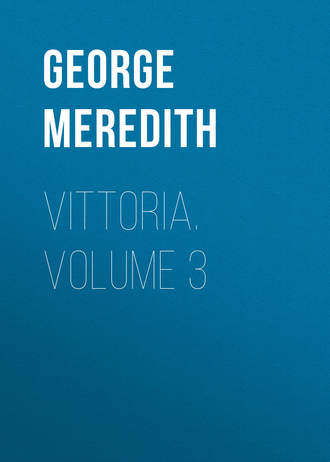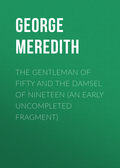
George Meredith
Vittoria. Volume 3
'Beast or man, devil or whatever you are!' cried Ammiani, feeling nevertheless oddly unnerved, 'you have committed a shameful offence: you, or the woman, your wife, who serves you, as I see. You have thwarted the best of plots; you have dared to act in defiance of your Chief—'
'Eyes to him!' Barto interposed, touching over his eyeballs.
'And you have thrown your accursed stupid suspicions on the Signorina Vittoria. You are a mad fool. If I had the power, I would order you to be shot at five this morning; and that 's the last rising of the light you should behold. Why did you do it? Don't turn your hellish eyes in upon one another, but answer at once! Why did you do it?'
'The Signorina Vittoria,' returned Barto—his articulation came forth serpent-like—'she is not a spy, you think. She has been in England: I have been in England. She writes; I can read. She is a thing of whims. Shall she hold the goblet of Italy in her hand till it overflows? She writes love-letters to an English whitecoat. I have read them. Who bids her write? Her whim! She warns her friends not to enter Milan. She— whose puppet is she? Not yours; not mine. She is the puppet of an English Austrian!'
Barto drew back, for Ammiani was advancing.
'What is it you mean?' he cried.
'I mean,' said Ammiani, still moving on him, 'I mean to drag you first before Count Medole, and next before the signorina; and you shall abjure your slander in her presence. After that I shall deal with you. Mark me! I have you: I am swifter on foot, and I am stronger. Come quietly.'
Barto smiled in grim contempt.
'Keep your foot fast on that stone, you're a prisoner,' he replied, and seeing Ammiani coming, 'Net him, my sling-stone! my serpent!' he signalled to his wife, who threw herself right round Ammiani in a tortuous twist hard as wire-rope. Stung with irritation, and a sense of disgrace and ridicule and pitifulness in one, Ammiani, after a struggle, ceased the attempt to disentwine her arms, and dragged her clinging to him. He was much struck by hearing her count deliberately, in her desperation, numbers from somewhere about twenty to one hundred. One hundred was evidently the number she had to complete, for when she had reached it she threw her arms apart. Barto was out of sight. Ammiani waved her on to follow in his steps: he was sick of her presence, and had the sensations of a shame-faced boy whom a girl has kissed. She went without uttering a word.
The dawn had now traversed the length of the streets, and thrown open the wide spaces of the city. Ammiani found himself singing, 'There's yet a heart in Italy!' but it was hardly the song of his own heart. He slept that night on a chair in the private room of his office, preferring not to go to his mother's house. 'There 's yet a heart in Italy!' was on his lips when he awoke with scattered sensations, all of which collected in revulsion against the song. 'There's a very poor heart in Italy!' he said, while getting his person into decent order; 'it's like the bell in the lunatic's tower between Venice and the Lido: it beats now and then for meals: hangs like a carrion-lump in the vulture's beak meanwhile!'
These and some other similar sentiments, and a heat about the brows whenever he set them frowning over what Barto had communicated concerning an English Austrian, assured Ammiani that he had no proper command of himself: or was, as the doctors would have told him, bilious. It seemed to him that he must have dreamed of meeting the dark and subtle Barto Rizzo overnight; on realizing that fact he could not realize how the man had escaped him, except that when he thought over it, he breathed deep and shook his shoulders. The mind will, as you may know, sometimes refuse to work when the sensations are shameful and astonished. He despatched a messenger with a 'good morrow' to his mother, and then went to a fencing-saloon that was fitted up in the house of Count Medole, where, among two or three, there was the ordinary shrugging talk of the collapse of the projected outbreak, bitter to hear. Luciano Romara came in, and Ammiani challenged him to small-sword and broadsword. Both being ireful to boiling point, and mad to strike at something, they attacked one another furiously, though they were dear friends, and the helmet- wires and the padding rattled and smoked to the thumps. For half an hour they held on to it, when, their blood being up, they flashed upon the men present, including the count, crying shame to them for letting a woman alone be faithful to her task that night. The blood forsook Count Medole's cheeks, leaving its dead hue, as when blotting-paper is laid on running-ink. He deliberately took a pair of foils, and offering the handle of one to Ammiani, broke the button off the end of his own, and stood to face an adversary. Ammiani followed the example: a streak of crimson was on his shirt-sleeve, and his eyes had got their hard black look, as of the flint-stone, before Romara in amazement discovered the couple to be at it in all purity of intention, on the sharp edge of the abyss. He knocked up their weapons and stood between them, puffing his cigarette leisurely.
'I fine you both,' he said.
He touched Ammiani's sword-arm, nodded with satisfaction to find that there was no hurt, and cried, 'You have an Austrian out on the ground by this time tomorrow morning. So, according to the decree!'
'Captain Weisspriess is in the city,' was remarked.
'There are a dozen on the list,' said little Pietro Cardi, drawing out a paper.
'If you are to be doing nothing else to-morrow morning,' added Leone
Rufo, 'we may as well march out the whole dozen.'
These two were boys under twenty.
'Shall it be the first hit for Captain Weisspriess?' Count Medole said this while handing a fresh and fairly-buttoned foil to Ammiani.
Romara laughed: 'You will require to fence the round of Milan city, my
dear count, to win a claim to Captain Weisspriess. In the first place,
I yield him to no man who does not show himself a better man than I.
It's the point upon which I don't pay compliments.'
Count Medole bowed.
'But, if you want occupation,' added Luciano, closing his speech with a merely interrogative tone.
'I scarcely want that, as those who know me will tell you,' said Medole, so humbly, that those who knew him felt that he had risen to his high seat of intellectual contempt. He could indulge himself, having shown his courage.
'Certainly not; if you are devising means of subsistence for the widows and orphans of the men who will straggle out to be slaughtered to-night,' said Luciano; 'you have occupation in that case.'
'I will do my best to provide for them,'—the count persisted in his air of humility, 'though it is a question with some whether idiots should live.' He paused effectively, and sucked in a soft smile of self- approbation at the stroke. Then he pursued: 'We meet the day after to-morrow. The Pope's Mouth is closed. We meet here at nine in the morning. The next day at eleven at Farugino's, the barber's, in Monza. The day following at Camerlata, at eleven likewise. Those who attend will be made aware of the dispositions for the week, and the day we shall name for the rising. It is known to you all, that without affixing a stigma on our new prima-donna, we exclude her from any share in this business. All the Heads have been warned that we yield this night to the Austrians. Gentlemen, I cannot be more explicit. I wish that I could please you better.'
'Oh, by all means,' said Pietro Cardi: 'but patience is the pestilence; I shall roam in quest of adventure. Another quiet week is a tremendous trial.'
He crossed foils with Leone Rufo, but finding no stop to the drawn 'swish' of the steel, he examined the end of his weapon with a lengthening visage, for it was buttonless. Ammiani burst into laughter at the spontaneous boyishness in the faces of the pair of ambitious lads. They both offered him one of the rapiers upon equal terms. Count Medole's example of intemperate vanity was spoiling them.
'You know my opinion,' Ammiani said to the count. 'I told you last night, and I tell you again to-day, that Barto Rizzo is guilty of gross misconduct, and that you must plead the same to a sort of excuseable treason. Count Medole, you cannot wind and unwind a conspiracy like a watch. Who is the head of this one? It is the man Barto Rizzo. He took proceedings before he got you to sanction them. You may be the vessel, but he commands, or at least, he steers it.'
The count waited undemonstratively until Ammiani had come to an end. 'You speak, my good Ammiani, with an energy that does you credit,' he said, 'considering that it is not in your own interest, but another person's. Remember, I can bear to have such a word as treason ascribed to my acts.'
Fresh visitors, more or less mixed, in the conspiracy, and generally willing to leave the management of it to Count Medole, now entered the saloon. These were Count Rasati, Angelo Dovili, a Piedmontese General, a Tuscan duke, and one or two aristocratic notabilities and historic nobodies. They were hostile to the Chief whom Luciano and Carlo revered and obeyed. The former lit a cigarette, and saying to his friend, 'Do you breakfast with your mother? I will come too,' slipped his hand on Ammiani's arm; they walked out indolently together, with the smallest shade of an appearance of tolerating scorn for those whom they left behind.
'Medole has money and rank and influence, and a kind of I-don't-know-what womanishness, that makes him push like a needle for the lead, and he will have the lead and when he has got the lead, there 's the last chapter of him,' said Luciano. 'His point of ambition is the perch of the weather- cock. Why did he set upon you, my Carlo? I saw the big V running up your forehead when you faced him. If you had finished him no great harm would have been done.'
'I saw him for a short time last night, and spoke to him in my father's style,' said Carlo. 'The reason was, that he defended Barto Rizzo for putting the ring about the Signorina Vittoria's name, and causing the black butterfly to be pinned to her dress.'
Luciano's brows stood up.
'If she sings to-night, depend upon it there will be a disturbance,' he said. 'There may be a rising in spite of Medole and such poor sparks, who're afraid to drop on powder, and twirl and dance till the wind blows them out. And mind, the chance rising is commonly the luckiest. If I get a command I march to the Alps. We must have the passes of the Tyrol. It seems to me that whoever holds the Alps must ride the Lombard mare. You spring booted and spurred into the saddle from the Alps.'
Carlo was hurt by his friend's indifference to the base injury done to
Vittoria.
'I have told Medole that she will sing to-night in spite of him,' he was saying, with the intention of bringing round some reproach upon Luciano for his want of noble sympathy, when the crash of an Austrian regimental band was heard coming up the Corso. It stirred him to love his friend with all his warmth. 'At any rate, for my sake, Luciano, you will respect and uphold her.'
'Yes, while she's true,' said Luciano, unsatisfactorily. The regiment, in review uniform, followed by two pieces of artillery, passed by. Then came a squadron of hussars and one of Uhlans, and another foot regiment, more artillery, fresh cavalry.
'Carlo, if three generations of us pour out our blood to fertilize
Italian ground, it's not too much to pay to chase those drilled curs.'
Luciano spoke in vehement undertone.
'We 'll breakfast and have a look at them in the Piazza d'Armi, and show that we Milanese are impressed with a proper idea of their power,' said Carlo, brightening as he felt the correction of his morbid lover's anger in Luciano's reaching view of their duties as Italian citizens. The heat and whirl of the hour struck his head, for to-morrow they might be wrestling with that living engine which had marched past, and surely all the hate he could muster should be turned upon the outer enemy. He gained his mother's residence with clearer feelings.
CHAPTER XVI
COUNTESS AMMIANI
Countess Ammiani was a Venetian lady of a famous House, the name of which is as a trumpet sounding from the inner pages of the Republic. Her face was like a leaf torn from an antique volume; the hereditary features told the story of her days. The face was sallow and fireless; life had faded like a painted cloth upon the imperishable moulding. She had neither fire in her eyes nor colour on her skin. The thin close multitudinous wrinkles ran up accurately ruled from the chin to the forehead's centre, and touched faintly once or twice beyond, as you observe the ocean ripples run in threads confused to smoothness within a space of the grey horizon sky. But the chin was firm, the mouth and nose were firm, the forehead sat calmly above these shows of decay. It was a most noble face; a fortress face; strong and massive, and honourable in ruin, though stripped of every flower.
This lady in her girlhood had been the one lamb of the family dedicated to heaven. Paolo, the General, her lover, had wrenched her from that fate to share with him a life of turbulent sorrows till she should behold the blood upon his grave. She, like Laura Fiaveni, had bent her head above a slaughtered husband, but, unlike Laura, Marcellina Ammiani had not buried her heart with him. Her heart and all her energies had been his while he lived; from the visage of death it turned to her son. She had accepted the passion for Italy from Paolo; she shared it with Carlo. Italian girls of that period had as little passion of their own as flowers kept out of sunlight have hues. She had given her son to her country with that intensely apprehensive foresight of a mother's love which runs quick as Eastern light from the fervour of the devotion to the remote realization of the hour of the sacrifice, seeing both in one. Other forms of love, devotion in other bosoms, may be deluded, but hers will not be. She sees the sunset in the breast of the springing dawn. Often her son Carlo stood a ghost in her sight. With this haunting prophetic vision, it was only a mother, who was at the same time a supremely noble woman, that could feel all human to him notwithstanding. Her heart beat thick and fast when Carlo and Luciano entered the morning- room where she sat, and stopped to salute her in turn.
'Well?' she said without betraying anxiety or playing at carelessness.
Carlo answered, 'Let us eat and drink, for to-morrow we die. I think that's the language of peaceful men.'
'You are to be peaceful men to-morrow, my Carlo?'
'The thing is in Count Medole's hands,' said Luciano; 'and he is constitutionally of our Agostino's opinion that we are bound to wait till the Gods kick us into action; and, as Agostino says, Medole has raised himself upon our shoulders so as to be the more susceptible to their wishes when they blow a gale.'
He informed her of the momentary thwarting of the conspiracy, and won
Carlo's gratitude by not speaking of the suspicion which had fallen on
Vittoria.
'Medole,' he said, 'has the principal conduct of the business in Milan, as you know, countess. Our Chief cannot be everywhere at once; so Medole undertakes to decide for him here in old Milan. He decided yesterday afternoon to put off our holiday for what he calls a week. Checco, the idiot, in whom he confides, gave me the paper signifying the fact at four o'clock. There was no appeal; for we can get no place of general meeting under Medole's prudent management. He fears our being swallowed in a body if we all meet.'
The news sent her heart sinking in short throbs down to a delicious rest; but Countess Ammiani disdained to be servile to the pleasure, even as she had strengthened herself to endure the shocks of pain. It was a conquered heart that she and every Venetian and Lombard mother had to carry; one that played its tune according to its nature, shaping no action, sporting no mask. If you know what is meant by that phrase, a conquered heart, you will at least respect them whom you call weak women for having gone through the harshest schooling which this world can show example of. In such mothers Italy revived. The pangs and the martyrdom were theirs. Fathers could march to the field or to the grey glacis with their boys; there was no intoxication of hot blood to cheer those who sat at home watching the rise and fall of trembling scales which said life or death for their dearest. Their least shadowy hope could be but a shrouded contentment in prospect; a shrouded submission in feeling. What bloom of hope was there when Austria stood like an iron wall, and their own ones dashing against it were as little feeble waves that left a red mark and no more? But, duty to their country had become their religion; sacrifice they accepted as their portion; when the last stern evil befell them they clad themselves in a veil and walked upon an earth they had passed from for all purposes save service of hands. Italy revived in these mothers. Their torture was that of the re-animation of her frame from the death-trance.
Carlo and Luciano fell hungrily upon dishes of herb-flavoured cutlets, and Neapolitan maccaroni, green figs, green and red slices of melon, chocolate, and a dry red Florentine wine. The countess let them eat, and then gave her son a letter that been delivered at her door an hour back by the confectioner Zotti. It proved to be an enclosure of a letter addressed to Vittoria by the Chief. Genoa was its superscription. From that place it was forwarded by running relays of volunteer messengers. There were points of Italy which the Chief could reach four-and-twenty hours in advance of the Government with all its aids and machinery. Vittoria had simply put her initials at the foot of the letter. Carlo read it eagerly and cast it aside. It dealt in ideas and abstract phraseology; he could get nothing of it between his impatient teeth; he was reduced to a blank wonder at the reason for her sending it on to him. It said indeed—and so far it seemed to have a meaning for her:
'No backward step. We can bear to fall; we cannot afford to draw back.'
And again:
'Remember that these uprisings are the manifested pulsations of the heart of your country, so that none shall say she is a corpse, and knowing that she lives, none shall say that she deserves not freedom. It is the protest of her immortal being against her impious violator.'
Evidently the Chief had heard nothing of the counterstroke of Barto Rizzo, and of Count Medole's miserable weakness: but how, thought Carlo, how can a mind like Vittoria's find matter to suit her in such sentences? He asked himself the question, forgetting that a little time gone by, while he was aloof from the tumult and dreaming of it, this airy cloudy language and every symbolism, had been strong sustaining food, a vital atmosphere, to him. He did not for the moment (though by degrees he recovered his last night's conception of her) understand that among the noble order of women there is, when they plunge into strife, a craving for idealistic truths, which men are apt, under the heat and hurry of their energies, to put aside as stars that are meant merely for shining.
His mother perused the letter—holding it out at arm's length—and laid it by; Luciano likewise. Countess Ammiani was an aristocrat: the tone and style of the writing were distasteful to her. She allowed her son's judgement of the writer to stand for her own, feeling that she could surrender little prejudices in favour of one who appeared to hate the Austrians so mortally. On the other hand, she defended Count Medole. Her soul shrank at the thought of the revolution being yielded up to theorists and men calling themselves men of the people—a class of men to whom Paolo her soldier-husband's aversion had always been formidably pronounced. It was an old and a wearisome task for Carlo to explain to her that the times were changed and the necessities of the hour different since the day when his father conspired and fought for freedom. Yet he could not gainsay her when she urged that the nobles should be elected to lead, if they consented to lead; for if they did not lead, were they not excluded from the movement?
'I fancy you have defined their patriotism,' said Carlo.
'Nay, my son; but you are one of them.'
'Indeed, my dearest mother, that is not what they will tell you.'
'Because you have chosen to throw yourself into the opposite ranks.'
'You perceive that you divide our camp, madame my mother. For me there is no natural opposition of ranks. What are we? We are slaves: all are slaves. While I am a slave, shall I boast that I am of noble birth? "Proud of a coronet with gems of paste!" some one writes. Save me from that sort of pride! I am content to take my patent of nobility for good conduct in the revolution. Then I will be count, or marquis, or duke; I am not a Republican pure blood;—but not till then. And in the meantime—'
'Carlo is composing for his newspaper,' the countess said to Luciano.
'Those are the leaders who can lead,' the latter replied. 'Give the men who are born to it the first chance. Old Agostino is right—the people owe them their vantage ground. But when they have been tried and they have failed, decapitate them. Medole looks upon revolution as a description of conjuring trick. He shuffles cards and arranges them for a solemn performance, but he refuses to cut them if you look too serious or I look too eager; for that gives him a suspicion that you know what is going to turn up; and his object is above all things to produce a surprise.'







